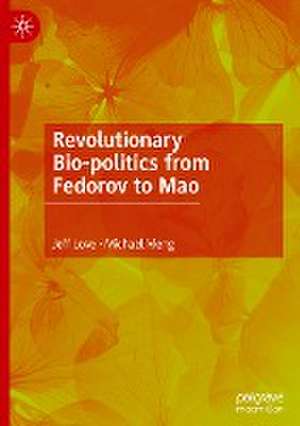Revolutionary Bio-politics from Fedorov to Mao
Autor Jeff Love, Michael Mengen Limba Engleză Hardback – 30 aug 2023
Preț: 693.39 lei
Preț vechi: 815.75 lei
-15% Nou
Puncte Express: 1040
Preț estimativ în valută:
132.68€ • 141.88$ • 110.63£
132.68€ • 141.88$ • 110.63£
Carte tipărită la comandă
Livrare economică 17 aprilie-01 mai
Preluare comenzi: 021 569.72.76
Specificații
ISBN-13: 9789819947447
ISBN-10: 9819947448
Ilustrații: VI, 131 p. 2 illus.
Dimensiuni: 148 x 210 mm
Greutate: 0.32 kg
Ediția:1st ed. 2023
Editura: Springer Nature Singapore
Colecția Palgrave Macmillan
Locul publicării:Singapore, Singapore
ISBN-10: 9819947448
Ilustrații: VI, 131 p. 2 illus.
Dimensiuni: 148 x 210 mm
Greutate: 0.32 kg
Ediția:1st ed. 2023
Editura: Springer Nature Singapore
Colecția Palgrave Macmillan
Locul publicării:Singapore, Singapore
Cuprins
Introduction.- Chapter 1: Becoming God.- Chapter 2: Recuperation of the Finite.- Chapter 3: Reconciliation—the Great Harmony.- Epilogue: Harmony with Suffering?
Notă biografică
Jeff Love is a Research Scholar at Northwestern University’s Initiative for the Study of Russian Philosophy and Religious Thought. He is the author of The Black Circle: A Life of Alexandre Kojève (Columbia University Press, 2018), Tolstoy: A Guide for the Perplexed (Continuum, 2008), and The Overcoming of History in War and Peace (Brill, 2004).
Michael Meng is Associate Professor of History at Clemson University. He is the author of Shattered Spaces: Encountering Jewish Ruins in Postwar Germany and Poland (Harvard, 2011) and co-editor of several volumes including Jewish Space in Contemporary Poland (Indiana, 2015) and Rebuilding Jewish Life in Germany (Rutgers, 2020).
Textul de pe ultima copertă
This book confronts the question of immortality: Is human life without immortality tolerable? It does so by exploring three attitudes to immortality expressed in the context of three revolutions, the Soviet, the Nazi and the Communist revolution in China. The book begins with an account of the radical Russian tradition of immortalism that culminates in the thought of Nikolai Fedorov (1829-1903), then contrasting this account with the equally radical finitism of Martin Heidegger (1889-1976). Both these strands are then developed in the context of modern Chinese philosophical thinking about technology and the creation of a harmonious relation to nature that reflects in turn a harmonious relation to mortality, one that eschews the radicality of both Fedorov and Heidegger by discerning a “middle way.”
Caracteristici
Opens up a new frontier in the history of technology Shows the interconnections between technology and theology Explores the ideological linkages of politics and science
